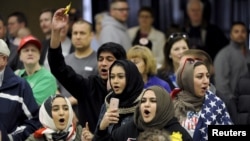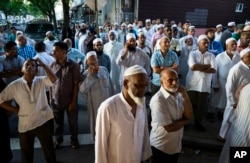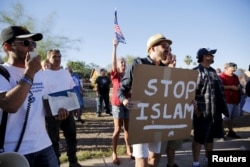Eighty-six percent of the registered Muslim voters in the U.S. say they plan to vote in the Nov. 8 presidential election in the midst of a perceived rise in Islamophobia, according to a new survey.
The Council on American-Islamic Relations (CAIR) released the results of a nationwide survey Thursday that found that 72 percent of American Muslim voters plan to cast their votes for Democratic presidential nominee Hillary Clinton, compared to 4 percent for Republican rival Donald Trump.
Three percent intend to vote for Green Party candidate Jill Stein and 2 percent plan to support Libertarian Party candidate Gary Johnson.
The survey also shows that 85 percent of Muslims believe that Islamophobia and anti-Muslim sentiment have increased in the U.S. in the past year. CAIR Executive Director Nihad Awad attributes the perceived rise to politicians like Trump, former Republican presidential hopefuls Ben Carson and Ted Cruz, and "ideologues around them who have allowed this Islamophobia to mushroom."
Reports of discrimination
Nearly one-third, or 30 percent, of the survey respondents said they felt they were discriminated against in the past year. Awad expressed serious concern, citing reports of apparent discrimination at public places such as airports, as well as vandalizing of mosques and hate-crime-related murders of Muslims.
"These numbers tell a story of a Muslim community that is hopeful and worried at the same time, worried that the national political discourse has deteriorated so much that they feel unsure about their future as American citizens because of the threats of having special policies that will be designed to target them," Awad said at a Washington news conference.
Awad said the possible policies that concern Muslim Americans include proposals that would, for example, require them to wear special identification cards, force the closure of mosques and bar foreign Muslims from entering the U.S.
Party leanings
Of the Muslims surveyed, 44 percent said they considered themselves political moderates, 25 percent were liberals, and 11 percent said they were conservatives.
The results suggest the historical trend of Muslims aligning with the Democratic Party has leveled off. Sixty-seven percent said they were Democrats, compared with 66 percent in 2012 and 49 percent in 2006.
Muslim affiliation with the Republican Party remains little changed, with 6 percent of the respondents expressing GOP membership compared with 9 percent in 2012 and 8 percent in 2008.
However, more Muslims have a negative perception of the Republican Party. Sixty-two percent of those surveyed said the Republican Party was unfriendly toward Muslims, an increase from 51 percent in 2012. The Democratic Party is perceived more favorably, with only 2 percent saying that party was not friendly toward Muslims.
An overwhelming majority of the respondents, 91 percent, thought that Trump's proposed temporary ban on Muslims entering the U.S. was wrong. Only 3 percent thought it was the right decision.
The survey also showed that nearly half of Muslim voters said the U.S. did not provide adequate support in the past year to defeat the Islamic State terrorist group in Iraq and Syria.
Eighty-two percent of the respondents support the resettlement of Syrian refugees in the U.S.
"Our survey results indicate that presidential candidates still have time to appeal to American Muslim voters by addressing issues such as the erosion of civil rights and growing Islamophobia," said CAIR Government Affairs Director Robert McCaw.
More than 800 Muslim voters were queried for the pre-election survey between Sept. 7 and Oct. 5. CAIR said the survey has a margin of error of 3.5 percentage points.







